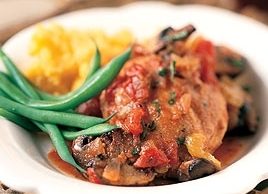Chicken Cacciatore
Chicken cacciatore is a rich-tasting Italian classic that’s perfect for a chilly night. Skinless chicken thighs keep the fat figures in check and the recipe’s combination of mushrooms, tomatoes and herbs provides just the right flavour. Serve chicken cacciatore with polenta and green beans.
Source: Cook Smart for a Healthy Heart, Reader’s Digest Canada

| Servings | Prep Time | Cook Time |
| 4servings | 20minutes | 45minutes |
| Servings | Prep Time |
| 4servings | 20minutes |
| Cook Time |
| 45minutes |
- 750 g bone-in chicken thighs
- 1/2 tsp pepper
- 1 large onion chopped
- 2 stalks celery thinly sliced
- 250 g button mushrooms quartered
- 1/2 cup dry red wine or reduced-salt chicken stock
- 1 796ml can crushed tomatoes
- 1 bay leaf
- 2 sprigs fresh rosemary
- 6 sprigs Italian parsley plus 1 tablespoon chopped to garnish
- 1/4 tsp paprika
|
Ingredients
Servings: servings
Units:
|
- Remove the skin from the chicken thighs, and then sprinkle the thighs with pepper. Lightly coat with nonstick cooking spray (preferably olive oil). Coat a large nonstick frying pan with nonstick cooking spray and set over high heat until hot but not smoking. Pan-fry the chicken until golden-brown, about 5 minutes on each side. Transfer the chicken to a plate.
- Reduce the heat to medium and add the onion, celery and mushrooms. Fry until the mushrooms are soft, about 5 minutes. Pour in the wine or stock. Reduce the heat to medium-low and simmer for 1 minute. Stir in the tomatoes, bay leaf, rosemary, parsley sprigs and paprika.
- Return the chicken to the frying pan. Simmer, partially covered, until the juices run clear, about 30 minutes. Remove the bay leaf, rosemary and parsley. Sprinkle the chicken cacciatore with the extra chopped parsley and serve.
Per serving: 268 calories, 25 g protein, 12 g total fat, 3 g saturated fat, 108 mg cholesterol, 11 g total carbohydrate, 9 g sugars, 6 g fibre, 149 mg sodium
A chicken thigh provides about 50 per cent more iron per 100 g serving than an equal serving of breast meat. During cooking, the alcohol in the wine evaporates, leaving just its concentrated flavour. The better the wine, the more mellow the flavour!




